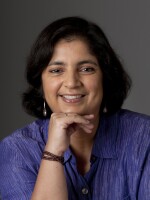In a small Pakistani village, near the Grand Trunk Road, a group of women is gathered in the home of their teacher. The women are shy and clearly a little overwhelmed as we enter the room. Their heads, covered of course, look down, and they are all nervously clutching a white rolled-up piece of paper.
It takes a while before I find out what it is they are clutching. We're here to talk about a literacy program they have all taken part in, learning to read via text messages over cell phones.
The course is taught in their village by teacher Farzana Gulzar. She stands at the front of the stiflingly hot bedroom in her house, encouraging her students to answer our questions.
What strikes us immediately is that none of them can really answer what we would consider the most basic question: How old are you?
"Maybe 31 or 32," says one. Another thinks she's 20. Even the teacher's answer is a little vague -- "About 24," she says.
Pretty soon we strike up a conversation. They are curious. How do I know what they are saying? I'm Punjabi, too, I answer.
I've encountered this before, in a village in India. In the struggle of daily life in rural parts of the subcontinent, your exact age is really immaterial. It is probably a bit of a luxury, as a birthday celebration among these poor families is out of the question.
Whatever their exact ages, these women have the weathered look of a hard life. One woman who thinks she is 35 is the mother of nine children. She looks like a grandmother, not like someone younger than me.
But these women have some gumption and an interest in learning.
They seized the opportunity when the Bunyad Foundation established a program to help teach them basic literacy. At the risk of ridicule from their families, they enrolled in a program where they could learn the alphabet, buy a cheap cell phone and then get text messages on the phone to practice.
At the end of the program the phone was theirs to keep, at one-fifth of the retail price.
As we finish our interviews, they are talking among themselves. They've realized that I have understood much of the Punjabi they have been speaking with our translator.
Pretty soon we strike up a conversation. They are curious. How do I know what they are saying? I'm Punjabi, too, I answer.
Where am I from, they ask. Where are my parents from? It takes a few moments to establish that I'm Punjabi and my parents hail from what is now Pakistan, but are, in fact, Hindu Indians who left at the time of partition in 1947.
They don't really seem to know about partition, when the British rule of the subcontinent ended and modern India and Pakistan were created.
They are curious to see pictures of my family. When they find out that I have daughters, their first question -- an inevitable one in the context of how we've met -- is: "Do they go to school?"
Yes, they do, I answer. This seems to satisfy them; it is a thin reed but one that connects us all.
It is with great pride that they unscroll the papers they have been clutching, certificates that testify to the program they have completed.
They are clearly proud of their achievement and it is no surprise to me that every single one of them has brought this piece of paper with them to show to us, not the cell phone, which has been immediately given up to others in the family.
Here, in a small Pakistani village off the Grand Trunk Road, where things may not have changed much over the centuries, these women have had a taste of change, and they are very pleased that we, the outsiders, have come to hear their story.
Madhulika Sikka is executive producer of NPR's Morning Edition. She was born in India, grew up in London and lives in the U.S.
Copyright 2022 NPR. To see more, visit https://www.npr.org. 9(MDAzMjM2NDYzMDEyMzc1Njk5NjAxNzY3OQ001))







